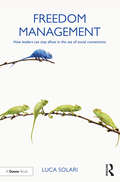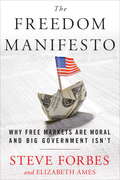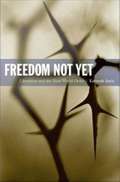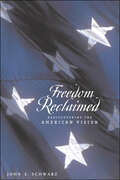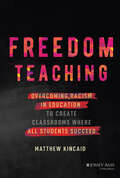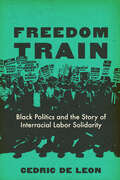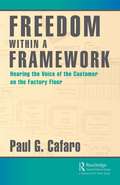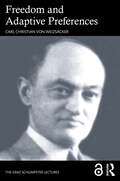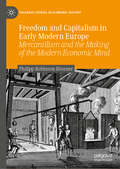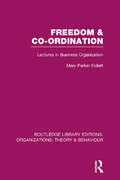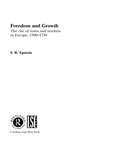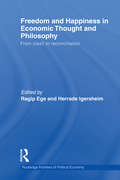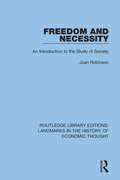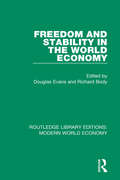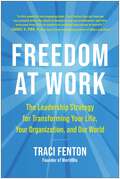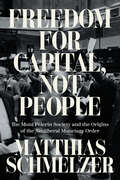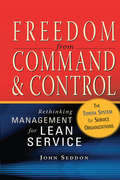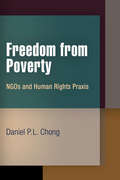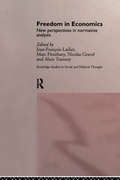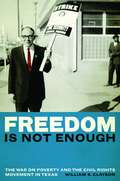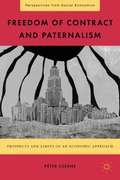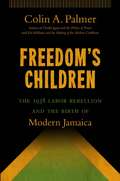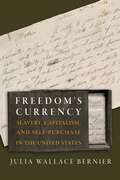- Table View
- List View
Freedom Management: How leaders can stay afloat in the sea of social connections
by Luca SolariModern management theory has been established on the ashes of Taylorism, emphasizing control over accountability, conformity over uniqueness, and constraint over freedom. Leadership and management theories and the practical approaches of this age of society can be understood as an ongoing struggle to overcome the boundaries of such a concept of organizations and society. Also latter movements, like empowerment or the competence based waves of change have left what we do in organizations largely unscathed. Organizations today are often bereft of a strong leadership function and the result is a decline in overall engagement. Luca Solari contends that this is because the change ahead requires a complete reshuffling of our conceptions of what it means to run an organization, and this will not come without pain for those in charge of managing, who are unable to shift their roles. It comes as no surprise that the complex pattern of preexisting interests acts like a powerful shield against this change within government, society, and business organizations alike. This book provides an essential argument as to why contemporary organizations need to change and offers practical guidance on how to overcome the waves, while helping your organization to thrive in this new era of management. This book will appeal to leaders, as well as those involved in human resource management and organizational change.
Freedom Manifesto: Why Free Markets Are Moral and Big Government Isn't
by Steve Forbes Elizabeth AmesFrom Steve Forbes, the iconic editor in chief of Forbes Media, and Elizabeth Ames coauthors of How Capitalism Will Save Us--comes a new way of thinking about the role of government and the morality of free markets. Americans today are at a turning point. Are we a country founded on the values of freedom and limited government, as envisioned by the founding fathers in the Declaration of Independence and the Constitution? Or do we want to become a European-style socialist democracy? What best serves the public good--freedom or Big Government? In Freedom Manifesto, Forbes and Ames offer a new twist on this historic debate. Today's bloated and bureaucratic government, they argue, is anything but a force for compassion. Instead of assuring fairness, it promotes favoritism. Instead of furthering opportunity, it stifles economic growth. Instead of unleashing innovation and material abundance, its regulations and price controls create rigidity and scarcity. Not only are Big Government's inefficient and ever-expanding bureaucracies ill-equipped to deliver on their promises--they are often guilty of the very greed, excess, and corruption routinely ascribed to the private sector. The only way to a truly fair and moral society, the authors say, is through economic freedom--free people and free markets. Throughout history, open markets have helped the poor and everyone else by unleashing unprecedented creativity, generating wealth, and raising living standards. Promoting trust, generosity, and democracy, economic freedom has been a more powerful force for individual rights, self-determination--and humanity--than any government bureaucracy. Freedom Manifesto captures the spirit of a new movement that is questioning old ideas about the morality of government and markets for the first time since the Great Depression. Going beyond the familiar explanations and sound bites, the authors provide a fully developed framework of "first principles" for a true understanding of the real moral and ethical distinctions between more and less government. This timely and provocative book shows why free markets and liberty are the only way to a better future and a fair and humane society.
Freedom Not Yet: Liberation and the Next World Order
by Kenneth SurinThe neoliberal project in the West has created an increasingly polarized and impoverished world, to the point that the vast majority of its citizens require liberation from their present socioeconomic circumstances. The marxist theorist Kenneth Surin contends that innovation and change at the level of the political must occur in order to achieve this liberation, and for this endeavor marxist theory and philosophy are indispensable. In Freedom Not Yet, Surin analyzes the nature of our current global economic system, particularly with regard to the plight of less developed countries, and he discusses the possibilities of creating new political subjects necessary to establish and sustain a liberated world. Surin begins by examining the current regime of accumulation--the global domination of financial markets over traditional industrial economies--which is used as an instrument for the subordination and dependency of poorer nations. He then moves to the constitution of subjectivity, or the way humans are produced as social beings, which he casts as the key arena in which struggles against dispossession occur. Surin critically engages with the major philosophical positions that have been posed as models of liberation, including Derrida's notion of reciprocity between a subject and its other, a reinvigorated militancy in political reorientation based on the thinking of Badiou and Zizek, the nomad politics of Deleuze and Guattari, and the politics of the multitude suggested by Hardt and Negri. Finally, Surin specifies the material conditions needed for liberation from the economic, political, and social failures of our current system. Seeking to illuminate a route to a better life for the world's poorer populations, Surin investigates the philosophical possibilities for a marxist or neo-marxist concept of liberation from capitalist exploitation and the regimes of power that support it.
Freedom Reclaimed: Rediscovering the American Vision
by John E. SchwarzA political scientist examines how the meaning of freedom has changed in American discourse—and how we can reclaim our most treasured value.The vision of American freedom that the Founders enshrined in the Declaration of Independence is very different from the free-market idea of freedom that is ascendant today. In Freedom Reclaimed, John E. Schwarz examines the profound implications of this shift in political rhetoric. Schwarz shows how the three-decade shift toward free-market freedom has brought economic hardship to the majority of Americans and suffering to the political life of the nation. As the nation moves further away from its impelling original commitment, most Americans now have only limited access to the freedom the Founders envisioned.In policy discussions on employment, education, social issues, and health care, Schwarz recasts our understanding of what freedom means and involves. He then sets forth a program that can help America return to its ennobling vision and resume its historic journey.
Freedom Teaching: Overcoming Racism in Education to Create Classrooms Where All Students Succeed
by Matthew KincaidBuild an anti-racist and culturally responsive school environment In Freedom Teaching, educator and distinguished anti-racism practitioner Matthew Kincaid delivers a one-stop resource for educators and educational leaders seeking to improve equity and increase the cultural responsiveness of their school. In this book, you’ll discover the meaning and fundamentals of anti-racist education and find a roadmap to reducing the impact of systemic racism in your classroom. The author offers skills and tools he’s developed over the course of his lengthy career teaching anti-racist ideas to educators, providing readers with strategies that are effective at both the individual teacher and collective school community level. Readers will also find: ● A thorough introduction to the idea of Freedom Teaching and creating an education system that works for all students ● Strategies for building and maintaining anti-racist schools and classrooms ● Important social justice lessons from unsung activists An indispensable resource for educators, educational leaders, and anyone who wants to actualize change in our education system, Freedom Teachingbelongs in the libraries of the parents and families of students and teachers in training hoping for a better understanding on anti-racist concepts and ideas.
Freedom Train: Black Politics and the Story of Interracial Labor Solidarity
by Cedric De LeonRevealing the central role of Black activists in spurring interracial solidarity in the US labor movement. Most accounts of interracial solidarity focus on white union activists. In Freedom Train, Cedric de Leon, a former organizer and elected leader in the US labor movement, argues that we can't comprehend the history of workers' triumphs in the United States without investigating the role of Black liberation. This book shows that, from the early twentieth century to the years immediately following the March on Washington and beyond, independent Black labor organizations have pushed the white labor movement toward a fierce and effective interracial solidarity. Drawing on the minutes, correspondence, and speeches of Black labor activists and organizations from 1917 to 1968, de Leon reveals that Black people have been the most ardent and consistent proponents of racial inclusion, leadership representation, and programs linking economic and racial justice. He also demonstrates how conflict and consensus among Black labor groups fueled the fight for solidarity, as different factions split and consolidated to form successive and sometimes competing Black labor organizations. Freedom Train centers the contributions of Black people to the multiracial unions we have today and demonstrates that internal conflict can be a source of strategic innovation and social movement success.
Freedom Within a Framework: Hearing the Voice of the Customer on the Factory Floor
by Paul G. CafaroFreedom Within a Framework: Hearing the Voice of the Customer on the Factory Floor (978-0-367-08577-3, K406714) Shelving Guide: Business and Management/Customer Satisfaction/Quality This book shows you how to harmonize three business functions to address customer needs by using a novel approach that combines Design for Six Sigma (DFSS) and Continuous Improvement tools. The DFSS tool used is the Quality Function Deployment (QFD) process, which is also known as the House of Quality (HOQ). Although these are techniques reserved for the design of new products, the book illustrates how the HOQ helps translate exactly what customers specifically find important about your products. In addition, if customers are experiencing issues with that product, it helps map those issues and prioritizes the Critical to Quality (CTQ) parameters. Because the HOQs tie the Voice of the Customer to CTQs, it continues to connect to the product design and ends with manufacturing process variables. This linkage makes this idea and approach unique. Stopping there may show that there is linkage between the customer and manufacturing process variables, but moving ahead, we must also connect the functions within the business that provides the product. The book helps define the key business function as three large business functions that must work as one cohesive and unified team. These functions are: commercial (sales and marketing), R&D (product properties and services), and operations (product quality). Connecting these functions involves many colleagues, and a very effective communication process among the three is vital for the success of the product and customer satisfaction. Understanding the voice of the customer is paramount—not doing so could lead to product performance issues and loss of market share. In addition, repeated customer dissatisfaction permeates internal workplace culture—employees begin to feel that they are producing products disconnected from end users’ needs and wants.
Freedom and Adaptive Preferences (The Graz Schumpeter Lectures)
by Carl Christian von WeizsäckerTraditional welfare economics works with the assumption of the fully rational economic agent (homo economicus) whose preferences are fixed: that is, they are not influenced by their economic environment. To the contrary, this book presents a theory of welfare economics that maintains the principles of normative individualism while allowing for adaptive or changeable preferences.Why do economists talk of preferences? In this book, Carl Christian von Weizsäcker shows that the concept is intimately related to freedom of action. The concept of preferences is the mode by which normative economics introduces the idea of freedom or liberty into its theory of human interaction. Moreover, the economic research of recent decades has provided a large amount of experimental and other empirical findings – e.g. the work on bounded rationality – which contradicts the assumption of fixed preferences. This book argues that this large body of findings is consistent with the hypothesis of adaptive preferences. This, together with the proposition that adaptive preferences allow a generalization of traditional welfare economics, has implications for policy applications of behavioral economics based on “normative individualism”. Normative individualism is an approach which intrinsically connects with the value of liberty or freedom. It is argued that normative individualism is indispensable for a society of free citizens, thus providing the foundations of civil liberty.This book will be of great interest to readers of welfare economics, behavioral economics and economic theory.
Freedom and Capitalism in Early Modern Europe: Mercantilism and the Making of the Modern Economic Mind (Palgrave Studies in Economic History)
by Philipp Robinson RössnerThis book hinges upon ideas and discourses variously known under labels such as “Mercantilism” and “Cameralism”. Often viewed as antithesis of capitalism, inclusive institutions and good economy in the “West”, this book re-assembles them and builds them into a coherent origin story of modern capitalism. It explores the field of intellectual and conceptual history, especially the history of Renaissance and Mercantilism in a longer history of capitalism. Rather than hindrances, the author argues that Mercantilist and Cameralist political economies presented essential stepping stones of modern capitalism, in Britain and beyond. This book will be of interest to academics and students in general economic history, the history of capitalism, economic development and the history of economic thought.
Freedom and Co-ordination: Lectures in Business Organization (Routledge Library Editions: Organizations)
by Mary Parker FollettA pioneer in the fields of organizational theory and behaviour Mary Parker Follett authored a number of books and numerous essays, articles and speeches on human relations, political philosophy, psychology and management. The first woman invited to address the London School of Economics, this book includes five lectures delivered to the newly-formed Department of Business Administration at the LSE in 1933, as well as six given by Parker Follett a the Taylor Society in New York in 1926.
Freedom and Growth: The Rise of States and Markets in Europe, 1300-1750 (Routledge Explorations In Economic History Ser.)
by S.R. EpsteinIn discussions on European pre-modern economic growth, the role of individual freedom and of the state has loomed large. This book examines whether different kinds of 'freedoms' (absolutist, parliamentary and republican) caused different economic outcomes, and shows the effect of different political regimes on long term development. It thus offers
Freedom and Happiness in Economic Thought and Philosophy: From Clash to Reconciliation (Routledge Frontiers Of Political Economy Ser. #147)
by Ragip Ege Herrade IgersheimStarting from a distinction made by the American philosopher, John Rawls, in 2000 between two kinds of liberalism, "liberalism of freedom" and "liberalism of happiness", this book presents a range of articles by economists and philosophers debating the most fundamental aspects of the subject. These include the exact significance of Rawls’ distinction and how it can be related to European political philosophy on the one hand and to utilitarianism on the other hand; the various definitions of happiness and freedom and their implications and the informational basis of individual preferences. The objectives of the book are twofold: first, it is devoted to a thorough analysis of the founding texts of both liberalisms. It aims to determine the logic of selection of the concepts which these traditions consider as relevant. The Kantian pair "Reasonable"/"Rational" can be seen as the basis on which these concepts are defined, our final concern being to reveal the profound relations of complementarity between them: we call it reconciliation. Secondly, we consider a fundamental issue of welfare economics – how to appraise individual preferences – in light of the Rawlsian distinction. It is emphasized that neither a criterion based on liberalism of freedom by itself, nor an evaluation in terms of liberalism of happiness by itself exhausts the question of utility. One must combine both aspects in order to cope with that issue. To do so, it is claimed that one can resort to the concept of metaranking of preferences. All the contributions included in this book are the outcomes of a collective research project of three years. The contributors come from a variety of backgrounds and yet are unified in developing a specific position about freedom and happiness. This book should be of interest to those focusing on the history of economic thought as well as moral, political and economic philosophy.
Freedom and Necessity: An Introduction to the Study of Society (Routledge Library Editions: Landmarks in the History of Economic Thought)
by Joan RobinsonOriginally published in 1970, this book examines the origins of social organizations, the development of Robinson Crusoe economies and the conception of property or rightful ownership, as well as the origins of agriculture, race and class. Discussing commerce and the nation state, capitalist expansion and war between industrial power, the book is a concise yet comprehensive survey of the evolution of the structures of the world’s economies and of the ideas which underlie them.
Freedom and Stability in the World Economy (Routledge Library Editions: Modern World Economy)
by Douglas Evans Richard BodyOriginally published in 1976. This collection of essays addresses the question of whether a free market economy, suitably modified as a social market economy according to the aspirations and requirements of individual societies, could be effectively recreated. In the face of the trends of the time towards collectivism, private ownership under state control, this was a main issue of the world economy in the post-Keynesian time. Previously it was held that some form of intervention by either national or supranational governments was an essential precondition for progress and stability world-wide, but this collection of essays suggests that this very interventionism created a level of instability that required a new set of ground rules. It considers how to plan for free market systems in a rigorous manner and assesses the real world problems of the day.
Freedom at Work: The Leadership Strategy for Transforming Your Life, Your Organization, and Our W orld
by Traci FentonDiscover the leadership strategy for unlocking your team&’s greatness. Whether it shows up as stress, top-down leadership styles, drama, or uncertainty, fear kills good decision-making, dampens morale, lowers employee engagement, and hurts bottom-line growth. The good news is that there&’s an antidote: Freedom at Work. In this groundbreaking book, Traci Fenton brings together decades of original research, based on her team&’s work with hundreds of top companies around the world, such as The WD-40 Company, Mindvalley, DaVita, Menlo Innovations, Zappos, HCL Technologies, and more, revealing the proven pathway to leadership success. This powerful strategy will benefit any leader at any level in any type of organization, from entrepreneurs to mid-level managers to the C-suite. Freedom at Work is based on three key pillars: Freedom-Centered Mindset: Break through limitations, make better decisions, and act with clarity and confidence Freedom-Centered Leadership: Lead yourself and others from a place of freedom rather than fear Freedom-Centered Design: Develop a world-class culture based on the 10 Principles of Organizational Democracy Freedom at Work is a revolutionary guide that will help make any organization high-performing and highly profitable, while creating a culture people love. This book will help passionate leaders weave freedom and democracy into our global tapestry through the way they run their teams and organizations—ultimately transforming our world for the better.
Freedom for Capital, Not People: The Mont Pèlerin Society and the Origins of the Neoliberal Monetary Order
by Matthias SchmelzerThe definitive history of neoliberal monetary thoughtBased on new archival sources, Freedom for Capital, Not People tells the story of how the Mont Pèlerin Society transformed the world economy. Founded in 1947 by economist Friedrich von Hayek, by the turn of the 1970s the society commanded influence at the highest levels of international monetary policy – with debates sparked by Hayek, Milton Friedman and Ludwig von Mises emigrating from the seminar room to the halls of power. The group&’s collective agenda, the result of years of fierce argument and shrewd political strategising, would dominate the next half century of global capitalism.
Freedom for Sale: Why the World Is Trading Democracy for Security
by John KampfnerDemocratic liberalism v. authoritarianism - the ideological divide that defined the twentieth century. But when the cold war ended, "the end of history" was proclaimed. Soon the fire of freedom would burn worldwide, the experts said. And where markets were freed, human rights would inevitably follow. Or not. In the last twenty years, nations including India, Russia, China and the United Arab Emirates have disproved the idea that capitalism and democracy are inextricably linked. Emerging middle classes have proven themselves all too willing to sacrifice certain democratic rights - including free speech, an open media, and free elections - in exchange for prosperity. But they are not alone. We are all doing it. Alarmingly, Western democracy has adopted some of the attributes of that authoritarianism. Combining boots on the ground reporting with incisive analysis, award-winning journalist John Kampfner describes this alarming trend - one which has only been exacerbated by the global economic meltdown - and what citizens must do to counter it.
Freedom from Command and Control: Rethinking Management for Lean Service
by John Seddon"Command and Control is failing us. There is a better way to design and manage work - a better way to make work work - but it remains unknown to the vast majority of managers."An adherent of the Toyota Production System, John Seddon explains how traditional top-down decision making within service organizations leads to managers
Freedom from Poverty: NGOs and Human Rights Praxis (Pennsylvania Studies in Human Rights)
by Daniel P.L. ChongHuman rights advocacy in the West is changing. Before the turn of the century, access to goods such as food, housing, and health care—while essential to human survival—were deemed outside of the human rights sphere. Traditional human rights institutions focused on rights in the political arena that could be defended through legal systems.In Freedom from Poverty, Daniel P. L. Chong examines how today's nongovernmental organizations are modifying human rights practices and reshaping the political landscape by taking up the cause of subsistence rights. This book outlines how three types of NGOs—human rights, social justice, and humanitarian organizations—are breaking down barriers by incorporating access to economic and social goods into national laws and advancing subsistence rights through nonjuridical means. These NGOs are using rights not only as legal instruments but as moral and rhetorical implements to build social movements, shape political culture, and guide development work. Rights language is now invoked in churches, political campaigns, rock concerts, and organizational mission statements. Chong presents a social theory of human rights to provide a framework for understanding these changes and defending the legitimacy of these rights.Freedom from Poverty analyzes new trends in the evolution of human rights by combining constructivist and postpositivist legal approaches. This book provides valuable concepts to human rights practitioners, political scientists, antipoverty advocates, and leaders who are serious about ending widespread privation and disease.
Freedom in Economics: New Perspectives in Normative Analysis (Routledge Studies in Social and Political Thought)
by Marc Fleurbaey Jean-François Laslier Nicolas Gravel Alain TrannoyThis book presents a range of papers by philosophers and economists who consider the definition and value of liberty; freedom in rights and equality of opportunity. Until recently freedom has played no explicit role in the conceptual framework of economists, however freedom seems to be at the heart of economics. The book provides a substantial contribution to the fruitful dialogue between the philosophy and economics in this area. Each chapter is integrated being followed by comments which explore the underlying debates. Contributors are French economists, philosophers and political scientists, as well as authors from Belgium and the Netherlands.
Freedom is Blogging in Your Underwear
by Hugh MacleodThis is a book about freedom. Specifically the personal freedom I discovered from the wonderful world of blogging, the freedom I hope everybody will eventually discover for themselves. The freedom that, I believe, will permanently and irrevocably change the world for the better. Having a blog, a voice, having my own media, utterly changed my life. Suddenly my career as a cartoonist wasn’t dependent on other people: “The Gatekeepers”—publishers, editors, Hollywood executives, etc. , etc. Suddenly I had direct contact with my audience. They had direct contact with me. I could just do my thing, without having to wait for somebody else to give me the “green light. ” I didn’t have to wait around for somebody else to deem me “worthy. ” This was the freedom I spent most of my adult life searching for, the same freedom I believe we’re ALL searching for, in one way or another. Careerwise, blogging gave me everything. Even in the early days, the benefits of blogging were so glaringly obvious to me, I couldn’t understand why more people weren’t doing it. Ten years later, I still can’t. So I decided to write a book about it; maybe I can help other people find this freedom, too. —Hugh .
Freedom is Not Enough
by William S. ClaysonLed by the Office of Economic Opportunity, Lyndon Johnson's War on Poverty reflected the president's belief that, just as the civil rights movement and federal law tore down legalized segregation, progressive government and grassroots activism could eradicate poverty in the United States. Yet few have attempted to evaluate the relationship between the OEO and the freedom struggles of the 1960s. Focusing on the unique situation presented by Texas, Freedom Is Not Enough examines how the War on Poverty manifested itself in a state marked by racial division and diversity - and by endemic poverty. Though the War on Poverty did not eradicate destitution in the United States, the history of the effort provides a unique window to examine the politics of race and social justice in the 1960s. William S. Clayson traces the rise and fall of post-war liberalism in the Lone Star State against a backdrop of dissent among Chicano militants and black nationalists who rejected Johnson's brand of liberalism. The conservative backlash that followed is another result of the dramatic political shifts revealed in the history of the OEO, completing this study of a unique facet in Texas's historical identity.
Freedom of Contract and Paternalism: Prospects and Limits of an Economic Approach (Perspectives from Social Economics)
by Péter CserneA theoretical discussion and internal critique of mainstream law and economics scholarship, especially as it approaches the issue of paternalism. Cserne discusses how, and to what extent, economic analysis can explain and/or justify the limitations on freedom of contract, with special emphasis on paternalism.
Freedom's Children
by Colin A. PalmerFreedom's Children is the first comprehensive history of Jamaica's watershed 1938 labor rebellion and its aftermath. Colin Palmer argues that, a hundred years after the abolition of slavery, Jamaica's disgruntled workers challenged the oppressive status quo and forced a morally ossified British colonial society to recognize their grievances. The rebellion produced two rival leaders who dominated the political life of the colony through the achievement of independence in 1962. Alexander Bustamante, a moneylender, founded the Bustamante Industrial Trade Union and its progeny, the Jamaica Labour Party. Norman Manley, an eminent barrister, led the struggle for self-government and with others established the People's National Party. Palmer describes the ugly underside of British colonialism and details the persecution of Jamaican nationalists. He sheds new light on the nature of Bustamante's collaboration with the imperial regime, the rise of the trade-union movement, the struggle for constitutional change, and the emergence of party politics in a modernizing Jamaica.
Freedom's Currency: Slavery, Capitalism, and Self-Purchase in the United States
by Julia Wallace BernierThe first comprehensive study of self-purchase in the United States from the American Revolution to the Civil WarEnslaved people lived in a world in which everything had a price. Even freedom. Freedom’s Currency follows enslaved people’s efforts to buy themselves out of slavery across the United States from the American Revolution to the Civil War. In the first comprehensive study of self-purchase in the nation, Julia Wallace Bernier reveals how enslaved people raised money, fostered connections, and made use of slavery’s systems of value and exchange to wrest control of their lives from those who owned them. She chronicles the stories of famous fugitives like Frederick Douglass, who, with the help of friends and supporters, purchased his freedom to protect himself against the continued legal claims of his enslavers and the possibility of recapture. She also shows how enslaved fathers like Lunsford Lane and mothers like Elizabeth Keckley tried to secure lives for their families outside of slavery.Freedom’s Currency argues that freedom played a central role in the social and economic lives of the enslaved and in the ways that these aspects of their lives overlapped. This intimate portrait of community illuminates the complexity of enslaved people’s ideas about their place at the intersection of slavery and American capitalism and their attempts to value freedom above all. Given the stakes—liberation or remaining enslaved—it is an account of both triumph and devastating failure.
